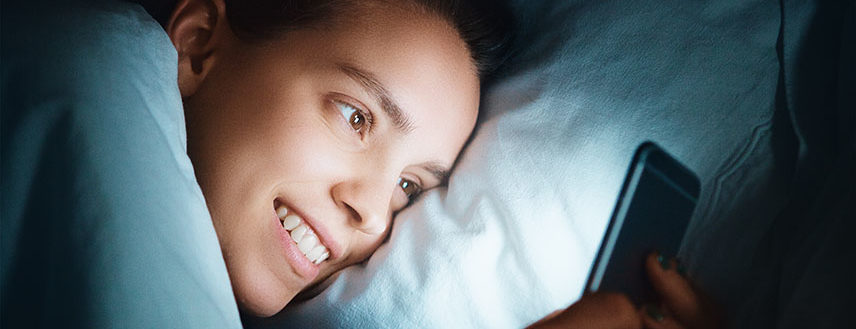
After a year of many of us spending more time than ever on screens, it’s time to really examine the negative effects of blue light. Research suggests that the blue light emitted by smartphones, tablets, laptops, and many other electronic devices, is negatively impacting the quantity and quality of our sleep. Darkness is a natural cue to our bodies that it’s time for sleep, but the light coming from our devices as we scramble to do just one more thing is interfering with our body’s sleep signals.
There are roughly 30,000 cells inside your eye that react to the wavelength of light which would be considered blue. Blue runs in about the 460 nanometer range, in terms of the spectrum of light. That particular spectrum of light hits these cells and makes them send a signal to an area of the brain known as the suprachiasmatic nucleus and tells it to turn off melatonin production. Melatonin is the hormone crucial for sleep.
According to a study by researchers from Harvard, in the past 50 years, there has been a decline in average sleep duration and quality, with negative consequences on general health. The paper assessed two groups; half read a normal printed book for four hours before bedtime for five consecutive nights, while the other group read a light-emitting tablet for the same period. The patients using the tablet showed suppressed levels of melatonin. On average, they took 10 minutes longer to fall asleep and displayed significantly less rapid eye movement (REM) sleep than the group reading printed books.
Not surprisingly, the tablet group reported feeling less tired in the evening, but they also reported that they felt more tired in the morning, despite having the same duration of sleep as the other group.
There are serious health issues that can arise if you aren’t getting enough sleep. When our circadian rhythms are out of synch, researchers believe we are put at more risk for health ailments including heart attacks, obesity and type-2 diabetes. Lack of sleep has also been linked to an increase in anxiety and depression.
With many people opting to continue working from home, we need to be more mindful of our blue light exposure. Limiting blue light exposure for at least 90 minutes prior to bed is an absolute must. Proximity is also an important factor. That’s why smartphones, tablets, and laptops are perceived as a bigger risk than light bulbs or TV screens.
If you do have to be on your screen, consider purchasing blue light blocking glasses. These glasses are specifically designed to filter out the harmful blue-violet light rays that are commonly emitted from digital screens. A 2017 study done by the University of Houston found that participants wearing the glasses showed about a 58% increase in their nighttime melatonin levels. Blue light is just one of the factors that determines your sleeping pattern, but it’s clearly an important one.

Leave a Reply